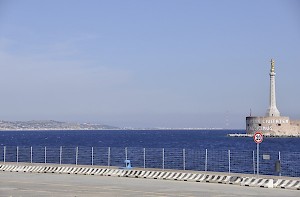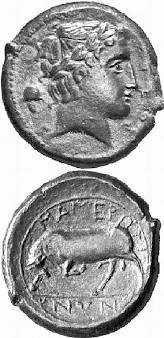Mamertines
Q1164281Mamertines: group of mercenaries living in Messana, often fighting like pirates.

The tyrants of Sicily had always employed mercenaries, which they had often hired in Campania and Central Italy. King Agathocles of Syracuse, who ruled from 304 to 289, had done the same. When he died, his mercenaries were discharged, but many of these strong young men refused to leave the island, and captured the Greek city of Messana, which is situated in the northeastern corner of Sicily and controls the Strait of Messina. This incident, which took place in c.288, was the beginning of the history of the Mamertines, who adopted the name of their war god Mamers (known to the Romans as Mars).
Using Messana as their base, the Mamertines plundered the neighboring districts as far as Gela and demanded tribute. Their activities were one of the reasons why the people of Syracuse in 278 invoked the help of king Pyrrhus of Epirus, who had already protected Tarentum against the Romans. The Mamertines allied themselves to the Carthaginians, who were eager to help them. After all, the alliance would give them control of the Straits. Pyrrhus defeated the Mamertines but did not advance to their town; instead, he concentrated on a more direct engagement with Carthage near Lilybaeum in the far west of Sicily. Soon, the Mamertines could resume their activities.
In 275, another group of Campanian soldiers, deserters from a Roman army, captured Rhegium on the other side of the Strait. It took a couple of years before the Romans had restored order in the "toe" of Italy.

Ten years later, the tyrant of Syracuse, Hiero II, defeated the Mamertines near the river Longanus, and proclaimed himself king. He continued to besiege the city of the pirates. Immediately, the Mamertines asked help from Carthage, which gladly intervened -there was a treaty, after all- and sent its admiral Hannibal, who was in the neighborhood (on the Aeolian Islands), to defend and garrison Messana. From now on, the Carthaginians controlled the Strait.
However, occupation was not the help the Mamertines had been hoping for. The Romans, who were ethnically close to the Campanians, received a call for help too, and decided to intervene, running the risk of full-scale Carthaginian intervention, and a terrible war. But Rome could not ignore the request: from Messana, the Carthaginians threatened the Greek towns of southern Italy's, Rome's new allies. In 264, one of the Roman consuls, Appius Claudius Caudex, invaded Sicily with two legions and captured Messana.
Thus, the First Punic War broke out. The Mamertines had to pay a prize for their liberation: they could no longer be pirates, and were forced to become allies of Rome. Few Mamertines will have regretted it, because the people who had as young men fought for Agathocles were becoming old. The alliance with Rome gave them a quiet old age.
Although their city was soon renamed Messina, the Mamertines were never entirely forgotten. In his catalogue of excellent wines, the Roman author Pliny the Elder praises the products of northeastern Sicily and especially "Mamertine wine".